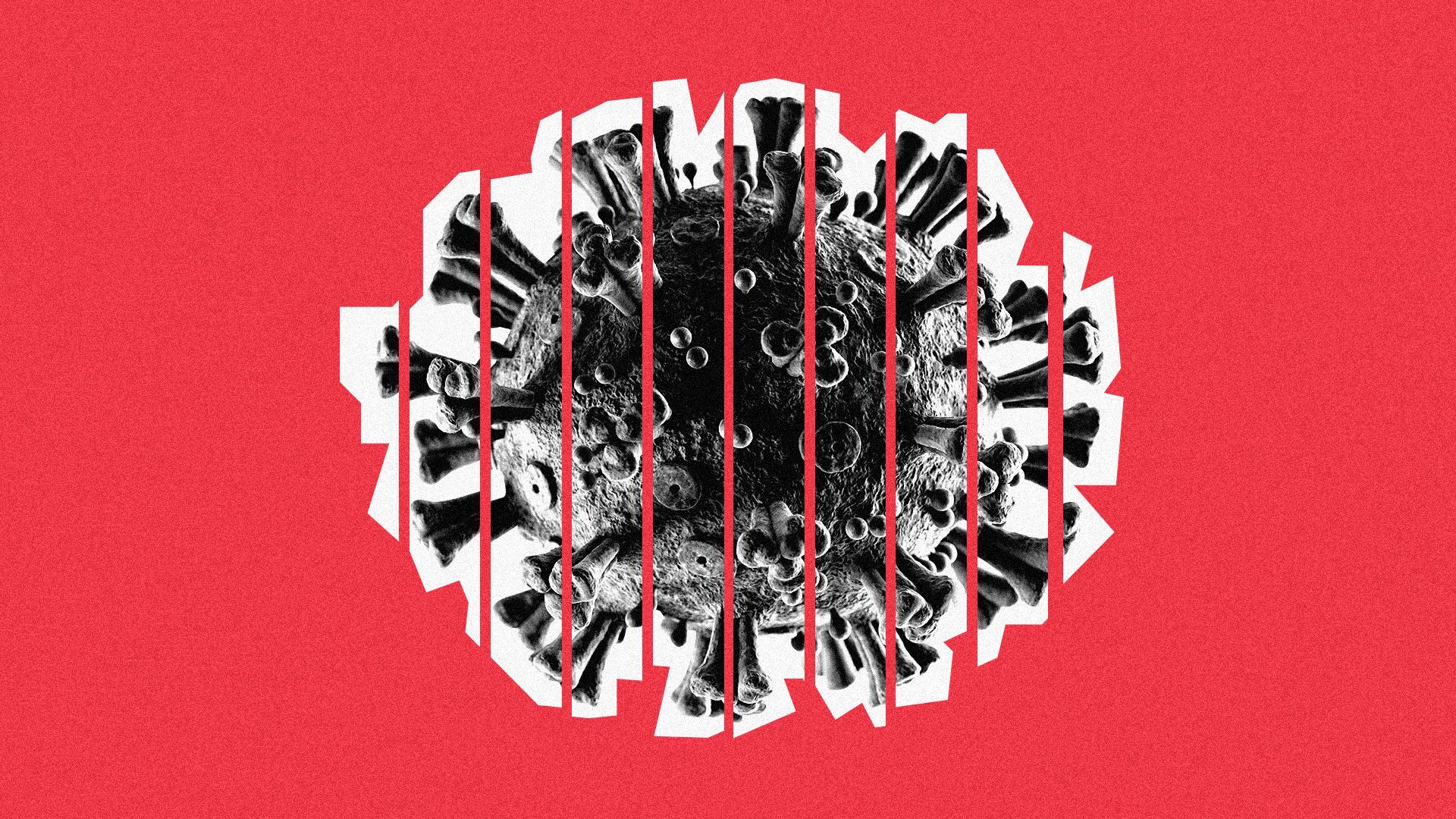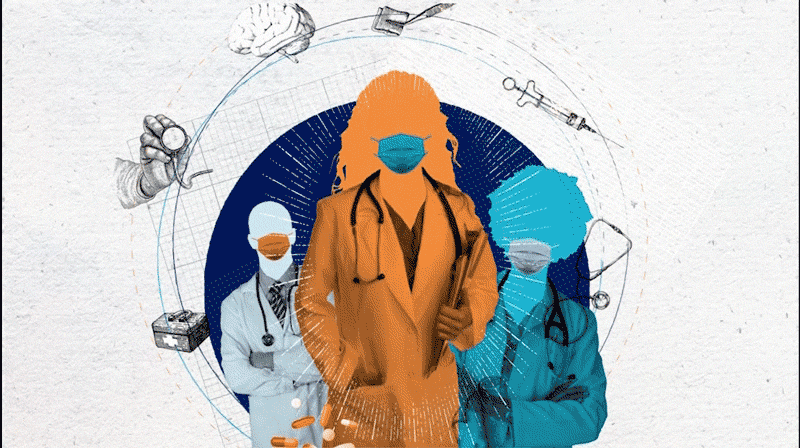| | | | | | | Presented By PhRMA | | | | Vitals | | By Caitlin Owens ·Oct 29, 2020 | | Good morning. Today's word count is 1,067, or a 4-minute read. | | | | | | 1 big thing: Coronavirus cases are at all-time high |  Data: The COVID Tracking Project, state health departments; Map: Andrew Witherspoon, Sara Wise/Axios In the final week before Election Day, new coronavirus infections have soared to an all-time high — virtually guaranteeing that the pandemic will be the most prominent issue in America as voters prepare to choose the next president, Axios' Sam Baker and Andrew Witherspoon report. The big picture: Cases are surging and local hospitals are straining at the very moment that voters are choosing between President Trump, who continues to insist that the pandemic is almost over, and Joe Biden, who has made the crisis a centerpiece of his campaign. Where it stands: On average, nearly 72,000 people tested positive for the coronavirus every day over the past week. That's the highest seven-day average on record. - Twice in the past week, the U.S. has set a new record for the most cases in a single day.
- The virus gained strength over the past week in 41 states, including nearly every important battleground state.
- New infections were up 16% in Arizona, 21% in Florida, 22% in Ohio, 23% in Wisconsin, 25% in Michigan and 33% in Pennsylvania.
- The only exception was North Carolina, where infections held steady at about 2,200 per day.
What's next: This third wave of infections is already beginning to strain hospitals' resources in some parts of the country, and will inevitably lead to more deaths. It has already killed nearly 220,000 Americans. - Wisconsin, for example, reported new single-day records for cases, hospitalizations and deaths — all in the same day.
- This will almost certainly get worse before it gets better. The virus is expected to spread more easily as colder weather causes people to move their socializing indoors.
The bottom line: Eight months into this pandemic, not only has the U.S. failed to contain the virus, it's spreading faster than ever. |     | | | | | | 2. Large outbreaks leading to high death rates |  Data: The COVID Tracking Project; Chart: Sara Wise/Axios Many of the states where coronavirus cases have recently skyrocketed are also seeing the highest death rates in the nation, a painful reminder that wherever the virus goes, death eventually follows. Between the lines: Deaths usually lag behind cases by a few weeks. Given America's record-high case counts, it's reasonable to expect that death rates across the country will continue to rise in tandem. Driving the news: Multiple states — including North and South Dakota and Wisconsin — had record hospitalizations yesterday. - "This is no longer a slow-motion disaster," Gregory Poland, director of the vaccine research group at Mayo Clinic in Rochester, Minnesota, told the Milwaukee Journal Sentinel earlier this week. "This is a disaster in warp speed. And it's maddening to me as a physician because a whole lot of people have died and are dying."
- White House coronavirus response coordinator Deborah Birx said earlier this week while visiting Montana that evidence shows cases are only going to increase in the state. "It's only going to get worse with the number of hospitalizations and the number of Montanans that die from this disease."
The bottom line: These states are leading the country at a rapid clip along a road that leads somewhere very ugly, and given the resistance to mitigation measures ranging from lockdowns to mask wearing, there's no real off ramp in sight. |     | | | | | | 3. A new round of shutdowns | | Several U.S. cities and European governments imposed new restrictions Wednesday to curb the spikes in COVID-19 cases, such as closing restaurants, bars and limiting social gatherings, Axios' Marisa Fernandez reports. In the U.S.: - Illinois' governor banned indoor dining and drinking in Chicago.
- New York Mayor Bill de Blasio implored residents not to travel out of state during the holiday season, noting that many other parts of the country have "skyrocketing levels of the coronavirus," the Washington Post reports.
- Denver tightened its restaurant and social gathering restrictions as the state asked the city's schools to consider hybrid or all virtual learning.
Internationally: - France reached a record level of more than 50,000 new confirmed cases in a 24-hour period over the weekend. Non-essential businesses, including bars and restaurants, will close, while schools and factories will remain open.
- Germany will close bars and restaurants nationwide for most of November.
- Russia imposed a mask mandate Tuesday.
- Belgium has the highest coronavirus infection rate in the EU, as the country debates imposing a new national lockdown.
- Italy's restrictions on restaurants, gyms, pools and theaters in the Lombardy and Campania regions has been met with protests, per AP.
|     | | | | | | A message from PhRMA | | The key to developing more – and more affordable – medicines | | |  | | | | One reason so many COVID-19 vaccine candidates are in late stage clinical trials is because companies are able to share information around vaccine technology. Our IP system – including patents – provide scientists with information that leads to more options for all kinds of treatments. | | | | | | 4. Pandemic scrambles acceptance of science |  | | | Illustration: Sarah Grillo/Axios | | | | The pandemic is throwing a wrench into Americans' understanding of science, which has big implications for climate change, Axios' Amy Harder reports. - Science is at the heart of understanding the impacts of a warming world and what kind of policies governments should enforce.
Driving the news: Recent focus groups in battleground states suggest some voters are more skeptical of scientists in the wake of the coronavirus pandemic, while surveys reveal the persistence of a deep partisan divide. Where it stands: Swing voters in five battleground states surveyed over the last six months expressed an increasing skepticism about science as the pandemic took over America. - The voters were asked whether, during the pandemic, scientific experts are a net-plus or net-minus when it comes to guiding public policy.
- In more recent months — August, September and October — the voters were more evenly divided on the question.
- In earlier months (April to July), more voters said scientists were a net-positive than said they were a net-negative.
The intrigue: These snapshots provide a rich backdrop to surveys that suggest a mixed picture of Americans' acceptance of science. - Nearly a third of voters in several battleground states say they have greater confidence in scientists since the pandemic, while 22% say their trust in science has weakened, according to a survey conducted by centrist think tank Third Way and ALG Research.
- That survey reiterated what Pew Research Center has found, which is that any increase in trust with experts has occurred almost exclusively among Democrats.
Go deeper. |     | | | | | | 5. Catch up quick |  | | | Illustration: Aïda Amer/Axios | | | | Stocks took a hit on Wednesday, with the S&P 500, Dow Jones Industrial Average and Nasdaq dropping more than 3% across the board. Senior White House adviser Jared Kushner bragged in an interview with Bob Woodward on April 18 about Trump "getting the country back from the doctors," in reference to the lifting of coronavirus restrictions, according to audio obtained by CNN. Assistant Secretary of Health Adm. Brett Giroir, who leads the federal government's coronavirus testing response, pushed back on Wednesday against President Trump's continued claims that rising coronavirus cases are a product of increased testing. The Boston Marathon, which is typically held in April, "will be postponed until at least the fall of 2021," because of the coronavirus pandemic, the Boston Athletic Association announced Wednesday. Los Angeles Dodgers third baseman Justin Turner will be investigated after he left isolation to celebrate with the team on the field, the MLB said in a statement on Wednesday. |     | | | | | | A message from PhRMA | | The key to developing more – and more affordable – medicines | | |  | | | | One reason so many COVID-19 vaccine candidates are in late stage clinical trials is because companies are able to share information around vaccine technology. Our IP system – including patents – provide scientists with information that leads to more options for all kinds of treatments. | | | | Don't forget to send in your dogs! | | | | Axios thanks our partners for supporting our newsletters.
Sponsorship has no influence on editorial content. Axios, 3100 Clarendon Blvd, Suite 1300, Arlington VA 22201 | | | You received this email because you signed up for newsletters from Axios.
Change your preferences or unsubscribe here. | | | Was this email forwarded to you?
Sign up now to get Axios in your inbox. | | | | Follow Axios on social media:    | | | | | |








No comments:
Post a Comment